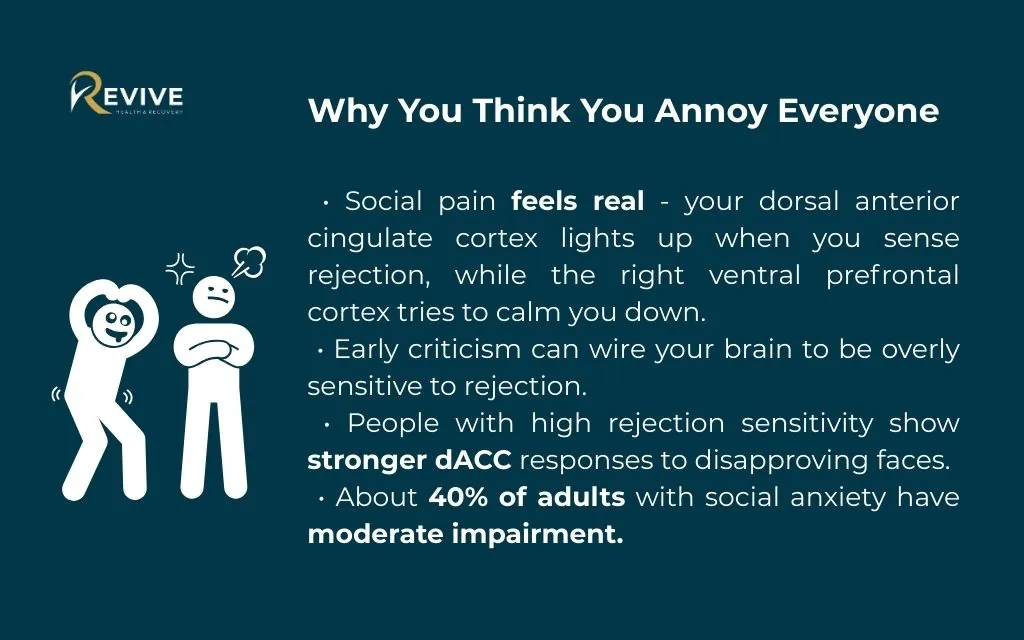Do you constantly worry that you’re bothering people when you speak? Do you often asking ‘why do i feel like i annoy everyone’? Do you analyze every social interaction for signs that others find you irritating? You’re not alone. This persistent fear affects millions and has deep psychological roots.
Research shows that feeling like you annoy everyone often stems from cognitive distortions, past experiences, and brain patterns that can be understood and changed. This comprehensive guide explores the science behind these feelings, their connection to depression and anxiety, and evidence-based strategies to help you build genuine social confidence.
Whether you’re experiencing mild social discomfort or debilitating self-doubt, understanding the “why” is the first step toward healing and healthier relationships.
The psychology behind feeling annoying
Your brain plays tricks on you when you feel like you annoy everyone. These aren’t character flaws or accurate perceptions. They’re specific patterns researchers have identified and studied.
Cognitive distortions that fuel these feelings
| Distortion Type | What It Looks Like | Real-Life Example |
| Mind Reading | Assuming others think negatively without evidence | Someone looks tired → “They find me boring” |
| Personalization | Taking responsibility for others’ reactions | Friend seems quiet → “I must have said something wrong” |
| All-or-Nothing | Believing in extremes only | “People either love me or hate me completely” |
| Mental Filtering | Focusing only on negative cues | Remembering 1 disinterested person, forgetting 5 engaged ones |
The neuroscience of social rejection sensitivity
Your brain contains specialized regions for detecting social threats. When you feel like you annoy everyone, these areas become hyperactive. The anterior cingulate cortex and right ventral prefrontal cortex work overtime, scanning for signs of rejection.
Past experiences shape these neural pathways. If you experienced early criticism or social rejection, your brain developed heightened sensitivity to similar situations. This evolutionary protection mechanism now creates problems in safe social environments.
Studies show that approximately 40% of people with social anxiety disorder experience persistent feelings of being annoying. This statistic helps normalize your experience while highlighting the need for targeted intervention.

Ready to understand your brain patterns better? Contact Revive Health Recovery at (303) 268-4655 for expert guidance.
The depression-social anxiety connection
Depression and social anxiety create a powerful cycle that reinforces feelings of being annoying. Understanding this connection helps break the pattern.
How depression distorts social perception
Depression creates a negative bias in interpreting social situations. Your brain automatically assumes the worst possible meaning behind neutral interactions. A delayed text response becomes evidence that you’re annoying, rather than recognition that people have busy lives.
Low mood directly impacts self-worth and social confidence. When you feel depressed, everything feels harder, including social interactions. You might speak less, smile less, or engage less enthusiastically. These changes can affect how others respond, creating the very rejection you feared.
The vicious cycle of isolation makes everything worse. You withdraw to avoid feeling annoying, but isolation worsens depression. Increased depression makes you feel more annoying, leading to greater isolation.
Social anxiety’s role in feeling annoying
Social anxiety creates hypervigilance to social threats and rejection cues. You notice every micro-expression, pause in conversation, or shift in body language. This constant monitoring exhausts you and distorts your perception of normal social interaction.
Physical symptoms of anxiety can actually affect your social interactions. Sweating, trembling, or voice changes might make you feel self-conscious. However, research shows these symptoms are far less noticeable to others than you believe.
Avoidance behaviors reinforce negative beliefs about yourself. When you avoid speaking up or participating fully, you never get evidence that contradicts your fears. This pattern strengthens the belief that you annoy everyone.
Common triggers and situations
Certain environments and relationships tend to trigger stronger feelings of being annoying. Recognizing these patterns helps you prepare and respond differently.
Workplace and professional settings
Common workplace triggers:
- Fear of speaking up in meetings despite having valuable insights
- Imposter syndrome making you question your professional worth
- Overanalyzing every brief colleague interaction for signs of disapproval
- Worrying about taking up too much time or saying something wrong
Personal relationships and friendships
Relationship challenges include:
- Text message anxiety around response timing and enthusiasm levels
- Social gathering discomfort leading to excessive apologizing
- Fear of being “too much” causing you to hold back genuine thoughts
- Constantly asking friends if you’re being annoying or inappropriate
Digital age amplifiers
Modern technology creates new forms of social stress that intensify feelings of being annoying. Social media comparison fuels inadequacy feelings. Read receipts create immediate anxiety about message reception. Online communication misunderstandings happen frequently due to missing tone and context.
Struggling with social situations? Revive Health Recovery offers specialized support. Email us at contact@revivehealthrecovery.com to learn more.
The self-fulfilling prophecy effect
Your fear of being annoying can actually create behaviors that push others away. Understanding this paradox is crucial for breaking the cycle.
How fear creates the reality you’re trying to avoid
Behavioral changes driven by fear of being annoying often backfire. You might speak less, leading others to perceive you as disinterested. You might apologize constantly, which can become genuinely irritating to others.
Excessive self-deprecation, while intended to show humility, can make others uncomfortable. When you constantly put yourself down, people don’t know how to respond appropriately.
Withdrawal and isolation prevent you from developing normal social rhythms. When you do interact, you might feel rusty or overly eager, creating awkward dynamics.

Breaking the cycle of negative assumptions
Effective strategies include:
- Reality testing techniques to gather actual evidence about your social impact
- Challenging catastrophic thinking by questioning worst-case assumptions
- Building evidence against negative beliefs by noticing positive social feedback
- Asking trusted friends for honest feedback about your communication style
Evidence-based strategies for healing from feeling annoying
Research supports several approaches for overcoming persistent feelings of being annoying. These strategies work best when combined and practiced consistently.
Cognitive behavioral techniques
| Technique | How It Works | Example Application |
| Thought Records | Identify and challenge distorted thinking | When thinking “I’m annoying,” examine actual evidence |
| Behavioral Experiments | Test assumptions in real situations | Share an opinion in meetings to see real consequences |
| Mindfulness Practice | Focus on present conversations vs. self-analysis | Engage genuinely rather than monitoring reactions |
Social skills and communication enhancement
Active listening techniques shift focus away from self-monitoring toward genuine engagement with others. When you truly listen, you’re less likely to feel self-conscious about your own contribution.
Assertiveness training helps you express your needs and opinions appropriately. Many people who feel annoying actually under-communicate, creating confusion rather than clarity.
Healthy boundary setting prevents you from overextending yourself in attempts to please others. When you maintain appropriate limits, relationships become more balanced and sustainable.

Self-compassion and worth-building practices
Key practices include:
- Self-talk transformation using the same kindness you’d show a good friend
- Values-based living focusing on what matters most to you
- Strengths identification and development building genuine self-worth
- Treating yourself with understanding instead of harsh criticism
Ready to develop these skills with professional support? Call Revive Health Recovery at (303) 268-4655 for personalized guidance.
When professional help is needed
While self-help strategies can be valuable, some situations require professional intervention. Recognizing these signs helps you get appropriate support.
Red flags indicating therapy would be beneficial
Seek professional help when you experience:
- Persistent social isolation impacting work or relationships
- Fear preventing participation in important life activities
- Sleep problems, appetite changes, or persistent hopelessness
- Significant interference with daily functioning
- Career advancement limitations due to social fears
Types of therapy that help
- Cognitive Behavioral Therapy (CBT)
Directly addresses thought patterns and behaviors maintaining feelings of being annoying. Research shows 70-80% success rates for CBT in treating social anxiety. - Dialectical Behavior Therapy (DBT)
Teaches emotional regulation skills and interpersonal effectiveness for managing intense emotions and better communication. - Social Skills Training Groups
Provide safe environments to practice new behaviors and receive feedback from others with similar challenges.
Building authentic connections in Colorado communities
Denver offers unique opportunities for healing and growth. Our local environment supports recovery through various resources and natural settings.
Local resources and support networks
Available resources:
- Denver-area support groups and meetups for people with similar struggles
- Mental Health America of Colorado programs and resources
- Community mental health organizations with sliding scale fees
- Outdoor and recreational therapy taking advantage of Colorado’s natural beauty
Creating meaningful relationships
Quality over quantity in friendships helps you focus on developing deep, authentic connections rather than worrying about pleasing everyone you meet. Finding your authentic social style means accepting your natural communication preferences rather than forcing uncomfortable patterns.
Contributing to community and purpose gives you something meaningful to focus on beyond self-perception. Volunteer work and community involvement provide natural opportunities for positive social interaction.
FAQs about ‘why do i feel like i annoy everyone’ feeling
Is feeling like I annoy everyone a sign of mental illness?
These feelings exist on a spectrum from normal social awareness to clinical social anxiety. When they significantly impact your daily life, relationships, or work performance, professional support becomes beneficial. Revive Health Recovery can help you assess whether your experience requires clinical intervention.
Can medication help with these feelings?
Medication can be helpful for underlying anxiety or depression, but therapy remains the first-line treatment for social concerns. Cognitive behavioral therapy addresses the specific thought patterns that maintain these feelings, while medication treats broader mood symptoms.
How long does it take to overcome these thoughts?
Most people see significant improvement within 12-16 weeks of consistent therapy, though individual timelines vary. The key is developing new thinking patterns and social skills that become automatic over time. Hope for improvement is realistic with proper support.
What if I actually am annoying people – how can I tell the difference?
Objective assessment involves seeking feedback from trusted friends or family members who can provide honest perspective. Most people who worry about being annoying actually under-communicate rather than over-communicate. Professional guidance helps distinguish between realistic social awareness and distorted self-perception.
Are there specific techniques I can try right now?
You can start by practicing the 5-4-3-2-1 grounding technique during social anxiety, challenging one negative thought per day with evidence, practicing self-compassion when you notice self-criticism, and setting one small social goal each week.
Why choose Revive Health Recovery for your journey
Transform your relationship with yourself and others at Denver’s premier healing center. Here’s why Revive Health Recovery stands out for addressing social anxiety and feelings of being annoying.
- Specialized social anxiety and depression treatment: Our experienced therapists understand the unique challenges of feeling socially inadequate and use proven techniques specifically designed for these concerns.
- Evidence-based approaches: We utilize the latest research in Cognitive Behavioral Therapy, mindfulness-based interventions, and interpersonal therapy to address the root causes of social self-doubt.
- Personalized healing plans: Every individual’s experience is unique. We create customized treatment plans that address your specific triggers, thought patterns, and relationship goals.
- Convenient Denver location: Located at 1427 S Federal Blvd, our center is easily accessible for Colorado residents, with flexible scheduling including evening and weekend appointments.
- Comprehensive support system: Beyond individual therapy, we offer group therapy sessions, family counseling, and ongoing support to help you build lasting social confidence and authentic connections.
You don’t have to live with the constant fear that you’re annoying everyone around you. These feelings, while painful, are treatable with the right support and strategies. At Revive Health Recovery, we’ve helped countless individuals in the Denver area overcome social anxiety, build genuine self-worth, and create meaningful connections.
Ready to start your journey toward social confidence and authentic relationships?
📧 Email us: contact@revivehealthrecovery.com
📞 Call us 24/7: (303) 268-4655
📍 Visit us: 1427 S Federal Blvd, Denver, CO 80219
Note: Revive Health Recovery specializes in outpatient counseling and therapy services. We provide a supportive healing environment focused on your mental wellness journey.
Conclusion
Understanding ‘why do I feel like I annoy everyone’ feeeling is the first step toward breaking free from this painful cycle. These feelings stem from specific psychological patterns that can be identified, understood, and changed with proper support. You don’t have to continue living with the constant worry that others find you irritating or burdensome.
The journey from feeling annoying to building authentic social confidence takes time and professional guidance. At Revive Health Recovery, we specialize in helping individuals in Denver and throughout Colorado overcome these challenges through evidence-based therapy and compassionate care. Your social anxiety and self-doubt can transform into genuine confidence and meaningful connections.
Take the first step toward healing today. Contact Revive Health Recovery at (303) 268-4655 or email contact@revivehealthrecovery.com to begin your journey toward social freedom and authentic relationships.



